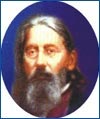Dreams : full of care, sorrow and fear; about thunder-storms; fire; of black water and darkness; of death,.
Time
General aggravation at night, especially after midnight (1 A.M.) Morning : Forenoon : Evening : Night Before midnight : After midnight : 1 A.M. : 11 A.M. and 3 P.M. :.
Temperature and Weather
Warmth almost always relieves the pain.
General aggravation from cold except headache, which is relieved by cold washing and cold air.
Cold damp cellars aggravate or bring on complaints Sciatica.
Cold ailments : cold water : washing: Cold air : Open air : Cold : Room : Warmth : Must be covered: uncovered : Change of temperature: Stormy weather : Heavy air :.
Chill Fever Sweat
Undefined development of chill (and heat); either simultaneously, or in alternation.
Shuddering without thirst, worse in open air.
Chill in forenoon not relieved by anything.
Internal chill, with external heat and red cheeks.
Chill without thirst, followed by heat with much thirst and no sweat; a sweat comes hours afterwards whereupon ailments increase; liver and spleen swollen. Dropsy.
External coldness, with cold, clammy sweat.
During chill (and during heat) aggravation of symptoms which existed previously, but were a slight importance.
Nursing children having no distinct chill must be covered; are very thirsty.
Blue nails and lips during chill.
Internal burning, dry heat; inclination to uncover.
Dry heat, evening and night, with thirst and frequent drinking of but a small quantity at a time.
Excessive heat with small, feeble and very frequent pulse; mouth dry, tongue so dry it is painful to move it; thirst followed by adipsia. Typhoid.
Heat at night, as if hot water were poured over one.
Sweat at the end of fever, with cessation of all previous symptoms; sweat relieves with pains; rheumatism.
Sweat in the morning without relief; cold clammy or sour and offensive smelling.
Sweats on going to sleep : goes off after sweating a little.
Profuse sweat about the knees, at night.
During the sweat unquenchable thirst.
Attacks
Periodically returning complaints.
Typhus tertianus antepones.
Sides
Right : Left : Left to right : Above downward :Below upward : Within outward :.
Sensations
Burning in internal and external parts.
As if hot water flowed through the blood-vessels, preventing sleep.
Sense of warm air streaming up the spine into the head Preceding epileptic attacks.
Tissues
Great emaciation, clay colored face, blue margins around eyes, great weakness of all limbs, want of disposition to do anything and constant inclination to rest.
Muscles lax.
General dropsy or of thoracic or abdominal cavities.
Post-Scarlatinal dropsy; waxy skin. Morbus Brightii.
Contact Injuries etc.
Touch : Pressure : Rubbing : Scratching : Snake bites.
Skin
Skin very white and pasty looking, later yellow, scaly. Skin dry and scaly.
Blue spots on skin.
Burning, itching parts painful after scratching.
Very painful black eruption.
Pimples burning violently, causing almost unendurable anguish.
Herpetic eruption itching and burning; eczema, dry desquamation burning pruritus.
Urticaria, large and very prominent.
Eruption resembling red petechiae, from the size of a fleabite to that of a lentil.
Eruption delays or suddenly pales, becomes livid or intermixed with petechiae, malignant sore throat: dropsy; or eruption well
out, but with disproportionate weakness, mild delirium, vomiting, etc. Scarlatina.
Black vesicles causing burning pain.
Variola, asthenic cases; pustules sink, areolae grow livid; also in hemorrhagic and septic forms.
Ulcer, with high edges; discharges black, coagulated blood.
Ulcer on leg covered with grey crust and surrounded with an inflamed border; burning and painful.
Painful sensitiveness of old ulcers.
Purulent, fetid secretions from eruptions.
Gangrenous aspect of sores.
Carbuncles.
Cancers with burning pain.
Itch-like eruption in bend of knees.
Stages and States
Hydrogenoid constitution of Grauvogl.
Suits the complaints of drunkards.
Relationship
Cognates : Anthrac (carbuncle; anthrax; pyaemia, etc.); Acet ac. (dropsy); Aconite (fever, paralysis, sudden chilling); Apis., Apocynum can.; Baptis. (sepsis; typhoid); Bismuth (vomiting); Borax (psoriasis); Cinchon. (debility, loss of fluids, dropsy, ague, gangrene ulcers, haemoptysis, diarrhoea, effects of putrid water, marsh-poisons, etc.); Carb. an (debility, glandular affections): Carbo veg. (debility, want of reaction, sepsis, especially ailments from putrid meats, fish or water etc.); Calcarea ars. (in epilepsy with heart symptoms); Camphor. (collapse, coldness, etc.); Capsicum (stomacace); Crotal. (blood poisoning); Cuprum (cholera, lack of reaction, paralysis, etc.); Cuprum ars (neuralgia of viscera); Ferrum (eruption lienteria, dropsy,
chlorosis, neuralgia, etc.): Graphit. (chronic eruptions); Hydrast. (superior in lupus); Ipecac. (chills and fever; asthma : catarrh of nose or chest with suffocation, summer complaint, especially in fat children; diarrhoea; vomiting etc.); Iris. vers.; Kali bichr. (often superior in lupus; Laches. (in sepsis, etc.); Acid Muriaticum Nitr. ac. (typhoid state; great debility, ulcers easily bleeding, diphtheria, etc.); Nux vomica (better in neuralgia, worse in morning); Phosphor.; Plumbum (paralysis, colic, tremors); Rhus tox. (mild delirium, erysipelas, ophthalmia. typhoid fever, with prostration and involuntary stool; skin symptoms, etc.); Secal. (cholera, diarrhoea ulcers, gangrene, etc.); Sulphur; Acid Sulphuricum; Tabac.; Terebintha (metritis, stupor with dark, turbid urine, etc.); Veratrum alb. (coldness, cholera, cholera morbus, cold sweat).
Complementary to All sat.
Bad effects from tobacco-chewing; abuse of quinine : iron or iodine.
Antidotes to Arsen. of large doses : sesquioxide of iron; hydrated peroxide of iron, or precipitated carbonate of iron; juice of sugar-cane, or honey-water. Limewater in copious draughts, emetics of sulphate of zinc. ll Carbonate of potash and magnesia, shaken in oil, Infusion of astringent substances. Large quantities of diluent drinks.
Of small doses : Camphor., Cinchon., China Sulph., Ferrum, Hepar, Iodium, Ipecac. Nux vomica, Sambuc., Tabac., Vertr.
Arsen. antidotes : Carb, veg., Cinchon., Ferrum, Graphit. Iodium., Laches. Mercur., Nux vomica, Veratrum
Lead poisonings, and evil effects of alcohol.

